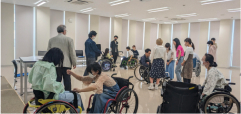新着情報NEWS
岐阜新聞 真学塾㊸ 教育学部 英語専修 ロナルド・クロスビー
Using Various Types of Media to Make Learning English Fun
岐阜聖徳学園大学教育学部専任講師 ロナルド・クロスビー
If you were to ask a child what their favorite subject in school is, one likely answer would be a class that they find to be fun and interesting. Making English fun can be a very difficult thing to do. Many children may not enjoy studying, the grammar can be difficult, and text books may not be interesting to most students.
I believe most teachers need to find ways to make English fun for students. Pop culture, which usually has things that appeal to the young, can make learning interesting. For English classes one of the best items pop culture offers for learning are comic books. This is because comic books cover many genres, so students have a good chance to find a story that they enjoy and wish to continue reading. Comics are also mostly written as conversations. This is important since they are written for native English speakers, it is unlikely that they will have strange, or unnatural, English. This is important because sadly, many textbooks students use have very mechanical and unrealistic examples of English use. By using comics students will be able learn many types of conversations. For example, seeing how to speak to older or more respected people, friends and peers, and even those that dislike each other. If students read these aloud a comic book can also turn into a speaking activity.
Another way I find to be far more enjoyable than simply using textbooks is the use of international TV shows and movies. Out of the two I have found that TV shows are a bit better as the stories take place across many episodes, similar to comics whereas a movie is usually a single and contained story. Modern technology has also greatly increases the potential of this method. People can now enjoy many foreign shows and movies even while on the go. They may listen to it in their native language first and then move on to a second language. This attaches the student to the flow and theme of the show or movie and helps them link word use between their own language and English. Additionally, if students listen to English dialog, as well as read English subtitles, they will find both their reading and listening abilities will get better over time. Students can also use shadowing techniques to help them with their speaking.
Now, especially, language learners have many types of study tools, both online and offline, to choose from. Additionally, most of these materials are now available all over the world and on demand. Importantly, in many cases, these come at no extra cost. That makes now a great time for language learners to just immerse themselves in the adventure of learning another language and broaden, if not amplify, their goals.
- 教育学部【お知らせ】
- 教育学部【イベント】
- 教育学部【公開講座】
- 外国語学部【お知らせ】
- 外国語学部【イベント】
- 外国語学部【公開講座】
- 経済情報学部【お知らせ】
- 経済情報学部【イベント】
- 経済情報学部【公開講座】
- 看護学部【お知らせ】
- 看護学部【イベント】
- 看護学部【公開講座】
- 人文学部【お知らせ】
- 人文学部【イベント】
- 短期大学部【お知らせ】
- 短期大学部【イベント】
- 大学院【お知らせ】
- 大学院【イベント】
- 大学院【公開講座】
- 図書館【お知らせ】
- 図書館【イベント】
- 図書館【公開講座】
- 図書館【在校生】
- 情報教育研究センター【お知らせ】
- 情報教育研究センター【イベント】
- 情報教育研究センター【公開講座】
- 教職教育センター【お知らせ】
- 教職教育センター【イベント】
- 教職教育センター【公開講座】
- 教職教育センター【在校生】
- 経済情報研究所【お知らせ】
- 経済情報研究所【イベント】
- 経済情報研究所【公開講座】
- 仏教文化研究所【お知らせ】
- 仏教文化研究所【イベント】
- 仏教文化研究所【公開講座】
- 仏教文化研究所【在校生】
- 仏教文化研究所【法話】
- DX推進センター【お知らせ】
- 地域・社会連携センター【お知らせ】
- 地域・社会連携センター【産官学連携】
- 地域・社会連携センター【高大連携】
- 地域・社会連携センター【イベント】
- 地域・社会連携センター【公開講座】
- 地域・社会連携センター【在校生】
- 子育て支援センターくれまちす【お知らせ】
- 国際交流【お知らせ】
- 国際交流【イベント】
- 入試情報【お知らせ】
- 入試情報【イベント】
- 学生生活【お知らせ】
- 学生生活【イベント】
- 学生生活【公開講座】
- 就職・キャリア【お知らせ】
- 就職・キャリア【イベント】
- 就職・キャリア【公開講座】
- 就職・キャリア【在校生】
- SDGSへの取り組み【お知らせ】
- 学生支援センター【お知らせ】
- 学生支援センター【イベント】
- サークル【お知らせ】
- ステークホルダー【受験生の方へ】
- ステークホルダー【社会人・一般の方へ】
- ステークホルダー【卒業生の方へ】
- ステークホルダー【在校生の方へ】
- ステークホルダー【保護者の方へ】
- ステークホルダー【企業・教育関係者の方へ】
- ステークホルダー【プレスリリース】









